
Scandia
Scope & Guideline
Fostering Innovative Research in Historical Studies
Introduction
Aims and Scopes
- Historical Analysis of Nordic Societies:
The journal emphasizes the examination of historical events, societal structures, and cultural transformations in Nordic countries, employing methodologies from history, sociology, and cultural studies. - Interdisciplinary Approaches:
Scandia promotes interdisciplinary research, blending history with fields such as political science, cultural studies, and environmental studies to provide a comprehensive understanding of the Nordic experience. - Focus on Identity and Nationalism:
A consistent theme is the exploration of national identity, regionalism, and the interplay of cultural narratives within the context of Scandinavian history. - Gender and Social Dynamics:
The journal addresses issues of gender, class, and social relations, examining how these dynamics influence historical narratives and contemporary societal structures. - Public Policy and Historical Context:
Research often links historical developments to contemporary public policy, particularly in areas such as welfare, education, and environmental issues, providing valuable historical context for current debates.
Trending and Emerging
- Environmental History:
An increasing number of papers are dedicated to environmental history, exploring the relationship between humans and their environment, particularly in the context of climate change and sustainability. - Cultural Heritage and Memory Studies:
There is a growing interest in cultural heritage and memory studies, examining how collective memories shape national identities and cultural narratives in the Nordic context. - Social Justice and Welfare State Analysis:
Recent trends indicate a focus on social justice issues and the evolution of the welfare state, particularly in light of contemporary challenges and historical legacies. - Digital Humanities:
The integration of digital humanities methods into historical research is on the rise, with scholars utilizing digital tools to analyze and present historical data in innovative ways. - Transnational Perspectives on History:
Emerging themes emphasize transnational perspectives, focusing on cross-border interactions and the shared histories of the Nordic countries, reflecting a broader, interconnected understanding of history.
Declining or Waning
- Traditional Military History:
There has been a noticeable decrease in papers focusing solely on military history, suggesting a shift towards more comprehensive analyses that incorporate social and cultural dimensions rather than purely military narratives. - Narrowly Defined National Histories:
The journal appears to be moving away from narrowly defined national histories, favoring broader, transnational approaches that consider the interconnectedness of Nordic countries and their histories. - Classical Historical Methodologies:
There is a decline in the use of classical historical methodologies that do not incorporate interdisciplinary perspectives, as the journal increasingly favors innovative approaches that include social sciences.
Similar Journals
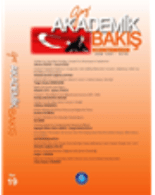
Gazi Akademik Bakis-Gazi Academic View
Elevating Scholarship, Connecting Communities.Gazi Akademik Bakis - Gazi Academic View is a distinguished peer-reviewed journal published by HALE SIVGIN, dedicated to fostering academic discourse and knowledge across various disciplines. Since its inception in 2007, the journal has embraced an Open Access model, ensuring that its valuable insights are freely accessible to researchers, professionals, and students worldwide. With an ISSN of 1307-9778 and E-ISSN 1309-5137, Gazi Academic View serves as a vital platform for innovative scholarship, promoting rigorous research and discussions that impact both local and international academic communities. Situated in Ankara, Turkiye, the journal's editorial strategy emphasizes inclusivity and the advancement of knowledge, making it an essential resource for anyone seeking to engage with contemporary issues in their respective fields. The journal aims to maintain a high standard of scholarly publication, often featuring studies that contribute to the evolution of theoretical and practical frameworks across multiple sectors.
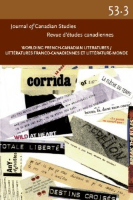
JOURNAL OF CANADIAN STUDIES-REVUE D ETUDES CANADIENNES
Connecting Cultures: The Heart of Canadian StudiesJOURNAL OF CANADIAN STUDIES-REVUE D’ÉTUDES CANADIENNES, published by University of Toronto Press Inc, stands as a leading interdisciplinary platform dedicated to advancing the understanding of Canada’s diverse cultural, historical, and social dimensions. With its ISSN 0021-9495 and E-ISSN 1911-0251, this prestigious journal has been crucial in fostering scholarly dialogue since its inception in 1968. Renowned in both the Cultural Studies (Q1) and History (Q1) categories, it demonstrates a remarkable impact in academic circles, as reflected in its Scopus rankings—81st percentile in History and 70th percentile in Cultural Studies. While it does not offer open access, the journal's articles provide invaluable insights that explore contemporary and historical narratives within the Canadian context, engaging a diverse audience of researchers, professionals, and students alike. The journal is based in Canada, maintaining a global perspective on Canadian Studies, reflecting the rich tapestry of Canada's past and present scholarly discourse.
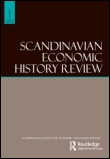
SCANDINAVIAN ECONOMIC HISTORY REVIEW
Advancing Knowledge in Scandinavian Economic TransformationsSCANDINAVIAN ECONOMIC HISTORY REVIEW, published by ROUTLEDGE JOURNALS, TAYLOR & FRANCIS LTD, stands as a significant scholarly platform dedicated to the exploration and analysis of economic history within the Scandinavian context. With an ISSN of 0358-5522 and an E-ISSN of 1750-2837, this journal has been publishing high-quality research since 1953 and continues its contribution to academia with a projected publication span extending to 2024. Renowned for its rigorous scholarship, the journal enjoys a commendable standing in the academic community, reflected in its Q1 classification in History and its competitive rankings across multiple categories. The journal particularly champions transdisciplinary approaches, encouraging researchers to engage with economic history through various lenses including the arts, humanities, and social sciences. Despite operating on a traditional access model, the impactful content delivered within its pages offers invaluable insights for researchers, professionals, and students striving to deepen their understanding of the economic transformations in Scandinavian societies.
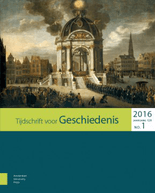
TIJDSCHRIFT VOOR GESCHIEDENIS
Connecting Scholars Through TimeTIJDSCHRIFT VOOR GESCHIEDENIS is a prestigious academic journal published by WOLTERS-NOORDHOFF B V, dedicated to the field of history. With its ISSN 0040-7518 and an established reputation in the Netherlands, this journal serves as a vital platform for researchers, professionals, and students to disseminate and engage with significant historical scholarship. The journal's impactful contributions have earned it a commendable Q2 category ranking in the history field for 2023, placing it in the top tier of history journals according to Scopus. Although not open access, TIJDSCHRIFT VOOR GESCHIEDENIS offers invaluable insights into various historical topics spanning from its converged years starting in 1983 through to 2024. This enduring commitment to scholarly excellence fosters robust academic discourse and acts as an essential resource for those engaged in historical studies.

BMGN-The Low Countries Historical Review
Unveiling Diverse Perspectives on the Low Countries' PastBMGN-The Low Countries Historical Review, published by the KONINKLIJK NEDERLANDS HISTORISCH GENOOTSCHAP, is a distinguished open-access journal dedicated to the study of the history of the Low Countries, offering insights and diverse perspectives on historical developments from the region. With an ISSN of 0165-0505 and an E-ISSN of 2211-2898, this journal has been a valuable resource since its inception in 1970, with its rich archive covering pivotal years including 1975 and periods from 1999 to 2002, as well as the continuous series since 2009. With a notable impact factor supporting its reputation—scoring a commendable Q3 in History and achieving the 85th percentile rank within the Arts and Humanities category—BMGN is instrumental in fostering scholarly dialogue and advancing historical discourse. The journal's open-access format ensures broad access to its content, supporting researchers, professionals, and students keen to explore the intricate tapestry of Low Countries history. With its office located in The Hague, Netherlands, BMGN continues to be a pivotal forum for historical engagement and publication.

Midland History
Fostering a Deeper Understanding of Regional HistoriesMidland History is a distinguished academic journal, grounded in the rich historical tapestry of the United Kingdom, and published by Routledge Journals, Taylor & Francis Ltd. With an ISSN of 0047-729X and an E-ISSN of 1756-381X, this journal serves as a vital platform for scholarly discourse on various aspects of regional and national history. Although categorized in the Q4 quartile for History in 2023, Midland History is committed to bridging gaps in current historical research and provides a unique opportunity for researchers, professionals, and students to engage with new findings and interpretations. The journal has been published in converged issues spanning from 1971 to 2024, indicating a long-standing commitment to scholarly excellence. Contributions often focus on the social, cultural, and political narratives that shaped the Midlands, making it an important resource for those interested in the intersections of historical practice and contemporary thought. While not currently an open-access journal, Midland History’s contributions are pivotal for fostering a deeper understanding of history within academic circles.

Acta Historica Universitatis Klaipedensis
Illuminating the Baltic Region's Rich HeritageActa Historica Universitatis Klaipedensis is a distinguished open access journal that has been contributing to the field of history since its inception. Published by the Institute of Baltic Region History & Archaeology at Klaipeda University, this influential journal, ISSN 1392-4095 and E-ISSN 2351-6526, has rapidly established itself as a credible platform for scholarly discourse in historical studies. Since its transition to an open access model in 2021, it has widened its reach, allowing researchers, professionals, and students across the globe to freely access and disseminate knowledge pertaining to history in the Baltic region and beyond. Following a rigorous peer-review process, contributions are meticulously curated to ensure a high standard of scholarly output. The journal holds a respectable Q3 ranking in the History category as of 2023, with a Scopus rank placing it among the top 20% of journals in its field.
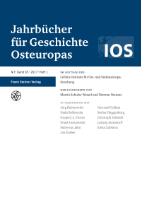
JAHRBUCHER FUR GESCHICHTE OSTEUROPAS
Connecting the Dots of Eastern Europe's Historical LandscapeJAHRBUCHER FUR GESCHICHTE OSTEUROPAS, published by FRANZ STEINER VERLAG GMBH, is a prominent academic journal dedicated to the exploration of Eastern European history. With its inception dating back to 1978, this journal has consistently provided a platform for scholarly discourse, contributing significantly to the understanding of the region's complex historical narratives. While the journal is not open access, it holds a solid reputation within the academic community, positioned in the Q4 quartile in history as per the 2023 category rankings, and stands at Rank #1636 within the Scopus Arts and Humanities History ranking. The convergence of its publication years throughout the decades emphasizes a long-standing commitment to historical research, thereby making it an essential resource for researchers, professionals, and students interested in Eastern European studies. Explore the intricate dynamics of historical events and cultural developments that shape Eastern Europe through this invaluable periodical.

Asia-Pacific Economic History Review
Fostering Interdisciplinary Dialogue on Economic HistoriesAsia-Pacific Economic History Review is a distinguished journal published by WILEY, focusing on the rich and dynamic intersection of economic and historical perspectives within the Asia-Pacific region. With the ISSN 2832-157X, this peer-reviewed journal stands out for its commitment to open access, ensuring that groundbreaking research is readily available to academics and practitioners alike. As a newly established platform from 2023 to 2024, it has rapidly garnered attention, earning a Q1 classification in History and Q3 in Economics and Econometrics for 2023, reflecting its dual significance in both fields. The journal's ranking within the Scopus database showcases its rising impact, particularly within the top percentile for Arts and Humanities in History. Scholars are encouraged to contribute to this high-quality, interdisciplinary forum that explores the economic histories of the Asia-Pacific region, providing valuable insights and fostering discourse among researchers, professionals, and students passionate about this vital area of study.
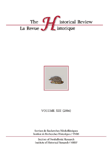
Historical Review-La Revue Historique
Bridging Eras Through Scholarly Dialogue.Historical Review-La Revue Historique, published by the NATL HELLENIC RES FOUNDATION, is a premier open-access journal focusing on the multifaceted field of history. Established in 2004 and operating out of Greece, this journal serves as a platform for the dissemination of scholarly research, critical essays, and innovative perspectives on historical events, figures, and themes. Though it has transitioned through different stages in its indexing, including a hiatus from Scopus coverage between 2009 to 2021, it has successfully maintained its presence in the academic community, evidenced by its current Q4 classification in the history category of Arts and Humanities. With an ISSN of 1790-3572 and an E-ISSN of 1791-7603, the journal continues to foster rich academic dialogue and inquiry, making research accessible to a wider audience. As a valuable resource for researchers, educators, and students, Historical Review-La Revue Historique contributes significantly to the understanding and appreciation of historical narratives and methodologies.